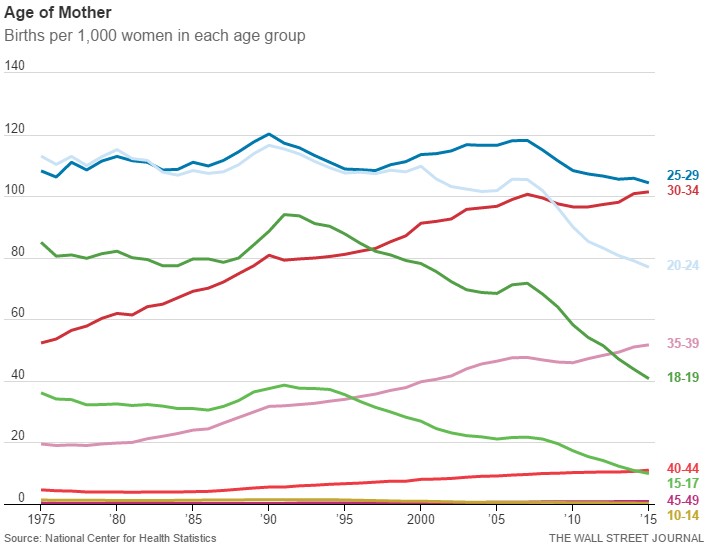We believe the biggest problem the U.S. economy and the stock market have is that our largest population group (millennials age 21-39) has been a “generation lost in space.” They have waited much later in life to get married, because the majority of them went to college. At about the time that their life should have started coming together, they lived through the aftermath of the biggest financial meltdown since the 1930s.
This extended post-meltdown phase caused the U.S. to be the country of movies designed to make us laugh about immature 26-year old men, as we watched them seek ruin with recreational drugs, alcohol and bachelor parties. We saw our culture get organized around feeding and entertaining single 25-35 year old people. They “are all in one place” (large cities) and their primary expense was rent. We became a renter nation!

Thank goodness a large portion of the millennials are in their thirties “with no time left to start again.” A recent Wall Street Journal chart (shown below) shows a huge uptick in births among women 30-39, and if you sit down with the numbers, you’ll see an anticipated explosion in the absolute number of 30-39 year olds over the next six years.2
A baby boom is probably upon us among 30-39 year old Americans, and the economic activity associated with marriage, babies, cars that fit car seats and buying houses is very bullish for our economy. Americans 24 years of age are the largest single age year in the U.S. population make up! Watch to see how “nimble” and “quick” Jack and Jill will be when they honeymoon at age 32.
“I met a girl who sang the blues
And I asked her for some happy news
But she just smiled and turned away
I went down to the sacred store
Where I’d heard the music years before
But the man there said the music wouldn’t play”
While everyone else is singing “the blues” (the same negative nabobs who have been trotted out for the last seven years), call us for the “happy news.” We will “smile” and not “turn away” because long-duration ownership of good quality companies has out lived every major watershed event for the last 36 years and we see it outliving this one. Temporarily lower prices and fears of the negative effects of unwinding globalization are no “sacred store.” We will stick with our discipline and are pleased it is tilted toward economic success inside the U.S.
1 Don McLean, American Pie. United Artists Records, 1971.
2 Source: The Wall Street Journal
William Smead is CEO and chief investment officer at Smead Capital Management.








